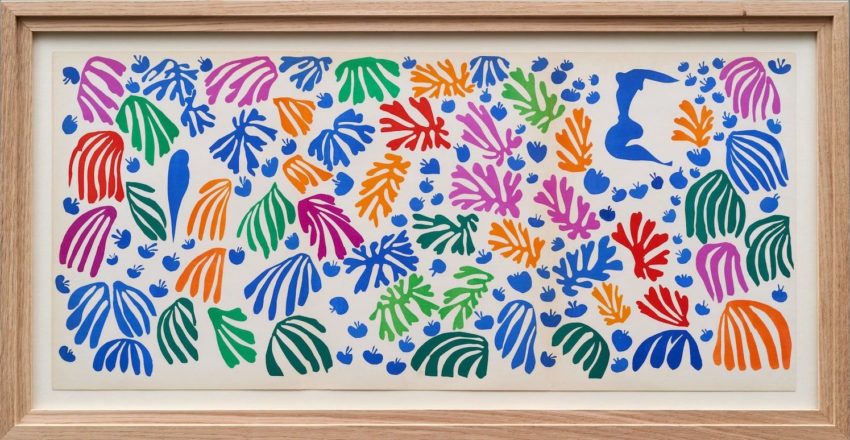
Art, Prints & Sculpture
Explore the full breadth of our decorative Works of Art. We have everything from numbered runs of prints and lithographs to original paintings and sketches. We specialise in London maps, including tube maps and plans of the City. Also lithographs by renowned Twentieth Century artists. You will find three dimensional sculpture in marble, bronze, plaster and more. Taxidermy and trophies are found alongside driftwood and weathervanes. Those in need of more functional pieces will discover shopkeepers and trade sign boards.
1410 items found
Page 4 of 15
-
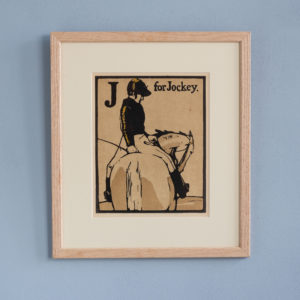
An Alphabet by William Nicholson, J for Jockey,
£400 eachAn Alphabet by William Nicholson, J for Jockey,
Nicholson was recommended by his friend, James McNeil Whistler to the publishers Heinemann as an original and expert wood-cut artist. The relationship with the publisher was highly successful, establishing Nicholson’s reputation as an illustrator. Between 1897 and 1900 he illustrated five works: An Alphabet, An Almanac of Twelve Sports, Twelve Portraits, London Types, and The Square Book of Animals.£400 each -
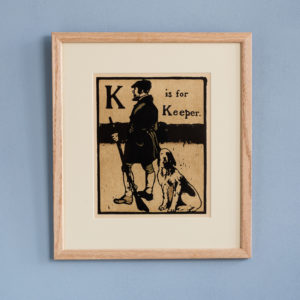
An Alphabet by William Nicholson, K is for Keeper,
£400 eachAn Alphabet by William Nicholson, K is for Keeper,
Nicholson was recommended by his friend, James McNeil Whistler to the publishers Heinemann as an original and expert wood-cut artist. The relationship with the publisher was highly successful, establishing Nicholson’s reputation as an illustrator. Between 1897 and 1900 he illustrated five works: An Alphabet, An Almanac of Twelve Sports, Twelve Portraits, London Types, and The Square Book of Animals.£400 each -
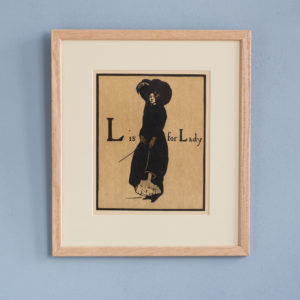
An Alphabet by William Nicholson, L is for Lady,
£400 eachAn Alphabet by William Nicholson, L is for Lady,
Nicholson was recommended by his friend, James McNeil Whistler to the publishers Heinemann as an original and expert wood-cut artist. The relationship with the publisher was highly successful, establishing Nicholson’s reputation as an illustrator. Between 1897 and 1900 he illustrated five works: An Alphabet, An Almanac of Twelve Sports, Twelve Portraits, London Types, and The Square Book of Animals.£400 each -
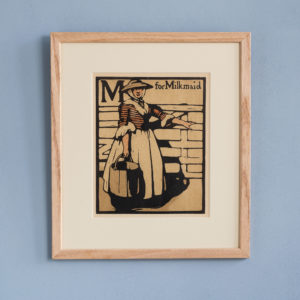
An Alphabet by William Nicholson, M for Milkmaid,
£400 eachAn Alphabet by William Nicholson, M for Milkmaid,
Nicholson was recommended by his friend, James McNeil Whistler to the publishers Heinemann as an original and expert wood-cut artist. The relationship with the publisher was highly successful, establishing Nicholson’s reputation as an illustrator. Between 1897 and 1900 he illustrated five works: An Alphabet, An Almanac of Twelve Sports, Twelve Portraits, London Types, and The Square Book of Animals.£400 each -
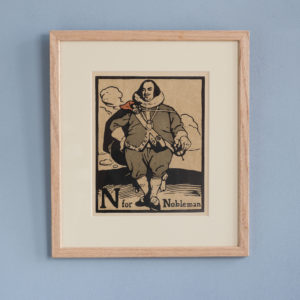
An Alphabet by William Nicholson, N for Nobleman,
£400 eachAn Alphabet by William Nicholson, N for Nobleman,
Nicholson was recommended by his friend, James McNeil Whistler to the publishers Heinemann as an original and expert wood-cut artist. The relationship with the publisher was highly successful, establishing Nicholson’s reputation as an illustrator. Between 1897 and 1900 he illustrated five works: An Alphabet, An Almanac of Twelve Sports, Twelve Portraits, London Types, and The Square Book of Animals.£400 each -
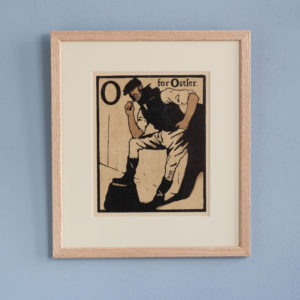
An Alphabet by William Nicholson, O for Ostler,
£400 eachAn Alphabet by William Nicholson, O for Ostler,
Nicholson was recommended by his friend, James McNeil Whistler to the publishers Heinemann as an original and expert wood-cut artist. The relationship with the publisher was highly successful, establishing Nicholson’s reputation as an illustrator. Between 1897 and 1900 he illustrated five works: An Alphabet, An Almanac of Twelve Sports, Twelve Portraits, London Types, and The Square Book of Animals.£400 each -
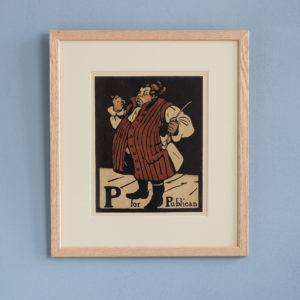
An Alphabet by William Nicholson, P for Publican,
£400 eachAn Alphabet by William Nicholson, P for Publican,
Nicholson was recommended by his friend, James McNeil Whistler to the publishers Heinemann as an original and expert wood-cut artist. The relationship with the publisher was highly successful, establishing Nicholson’s reputation as an illustrator. Between 1897 and 1900 he illustrated five works: An Alphabet, An Almanac of Twelve Sports, Twelve Portraits, London Types, and The Square Book of Animals.£400 each -
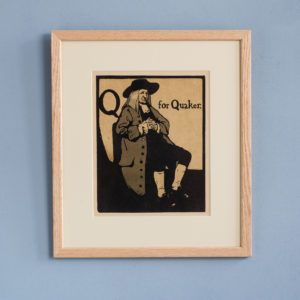
An Alphabet by William Nicholson, Q for Quaker,
£400 eachAn Alphabet by William Nicholson, Q for Quaker,
Nicholson was recommended by his friend, James McNeil Whistler to the publishers Heinemann as an original and expert wood-cut artist. The relationship with the publisher was highly successful, establishing Nicholson’s reputation as an illustrator. Between 1897 and 1900 he illustrated five works: An Alphabet, An Almanac of Twelve Sports, Twelve Portraits, London Types, and The Square Book of Animals.£400 each -
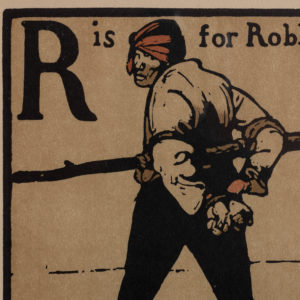
An Alphabet by William Nicholson, R is for Robber,
£400 eachAn Alphabet by William Nicholson, R is for Robber,
Nicholson was recommended by his friend, James McNeil Whistler to the publishers Heinemann as an original and expert wood-cut artist. The relationship with the publisher was highly successful, establishing Nicholson’s reputation as an illustrator. Between 1897 and 1900 he illustrated five works: An Alphabet, An Almanac of Twelve Sports, Twelve Portraits, London Types, and The Square Book of Animals.£400 each -

An Alphabet by William Nicholson, S for Sportsman,
£400 eachAn Alphabet by William Nicholson, S for Sportsman,
Nicholson was recommended by his friend, James McNeil Whistler to the publishers Heinemann as an original and expert wood-cut artist. The relationship with the publisher was highly successful, establishing Nicholson’s reputation as an illustrator. Between 1897 and 1900 he illustrated five works: An Alphabet, An Almanac of Twelve Sports, Twelve Portraits, London Types, and The Square Book of Animals.£400 each -
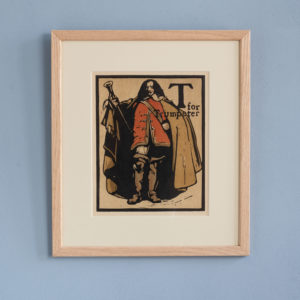
An Alphabet by William Nicholson, T for Trumpeter,
£400 eachAn Alphabet by William Nicholson, T for Trumpeter,
Nicholson was recommended by his friend, James McNeil Whistler to the publishers Heinemann as an original and expert wood-cut artist. The relationship with the publisher was highly successful, establishing Nicholson’s reputation as an illustrator. Between 1897 and 1900 he illustrated five works: An Alphabet, An Almanac of Twelve Sports, Twelve Portraits, London Types, and The Square Book of Animals.£400 each -
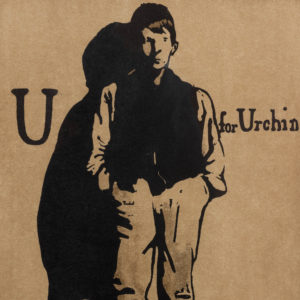
An Alphabet by William Nicholson, U for Urchin,
£400 eachAn Alphabet by William Nicholson, U for Urchin,
Nicholson was recommended by his friend, James McNeil Whistler to the publishers Heinemann as an original and expert wood-cut artist. The relationship with the publisher was highly successful, establishing Nicholson’s reputation as an illustrator. Between 1897 and 1900 he illustrated five works: An Alphabet, An Almanac of Twelve Sports, Twelve Portraits, London Types, and The Square Book of Animals.£400 each -
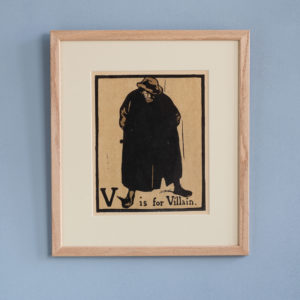
An Alphabet by William Nicholson, V is for Villain,
£400 eachAn Alphabet by William Nicholson, V is for Villain,
Nicholson was recommended by his friend, James McNeil Whistler to the publishers Heinemann as an original and expert wood-cut artist. The relationship with the publisher was highly successful, establishing Nicholson’s reputation as an illustrator. Between 1897 and 1900 he illustrated five works: An Alphabet, An Almanac of Twelve Sports, Twelve Portraits, London Types, and The Square Book of Animals.£400 each -
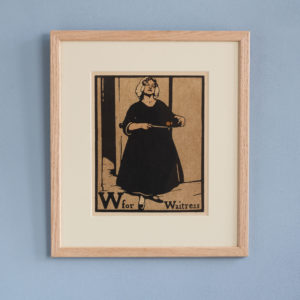
An Alphabet by William Nicholson, W for Waitress,
£400 eachAn Alphabet by William Nicholson, W for Waitress,
Nicholson was recommended by his friend, James McNeil Whistler to the publishers Heinemann as an original and expert wood-cut artist. The relationship with the publisher was highly successful, establishing Nicholson’s reputation as an illustrator. Between 1897 and 1900 he illustrated five works: An Alphabet, An Almanac of Twelve Sports, Twelve Portraits, London Types, and The Square Book of Animals.£400 each -
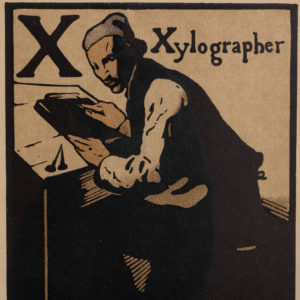
An Alphabet by William Nicholson, X Xylographer,
£400 eachAn Alphabet by William Nicholson, X Xylographer,
Nicholson was recommended by his friend, James McNeil Whistler to the publishers Heinemann as an original and expert wood-cut artist. The relationship with the publisher was highly successful, establishing Nicholson’s reputation as an illustrator. Between 1897 and 1900 he illustrated five works: An Alphabet, An Almanac of Twelve Sports, Twelve Portraits, London Types, and The Square Book of Animals.£400 each -
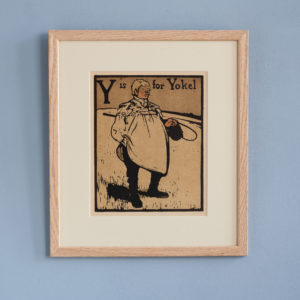
An Alphabet by William Nicholson, Y is for Yokel,
£400 eachAn Alphabet by William Nicholson, Y is for Yokel,
Nicholson was recommended by his friend, James McNeil Whistler to the publishers Heinemann as an original and expert wood-cut artist. The relationship with the publisher was highly successful, establishing Nicholson’s reputation as an illustrator. Between 1897 and 1900 he illustrated five works: An Alphabet, An Almanac of Twelve Sports, Twelve Portraits, London Types, and The Square Book of Animals.£400 each -
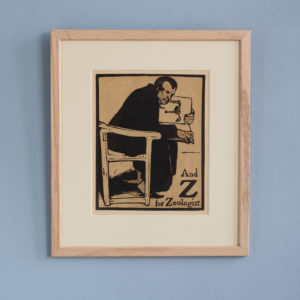
An Alphabet by William Nicholson, And Z for Zoologist,
£400 eachAn Alphabet by William Nicholson, And Z for Zoologist,
Nicholson was recommended by his friend, James McNeil Whistler to the publishers Heinemann as an original and expert wood-cut artist. The relationship with the publisher was highly successful, establishing Nicholson’s reputation as an illustrator. Between 1897 and 1900 he illustrated five works: An Alphabet, An Almanac of Twelve Sports, Twelve Portraits, London Types, and The Square Book of Animals.£400 each -
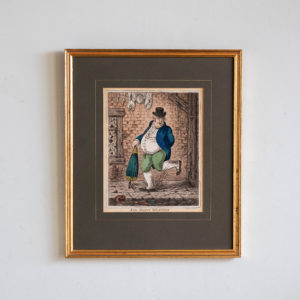
Sad Sloppy Weather
£400Sad Sloppy Weather
A framed and mounted, hand coloured engraving by the Georgian satirist James Gilray depicting a prosperous, elderly gentleman walking along a soggy pavement past mean dwellings after a rain shower. Holding a closed and reversed umbrella as a walking-stick he examines his white stockings as they become soiled with the filth of the poorly paved street.£400 -
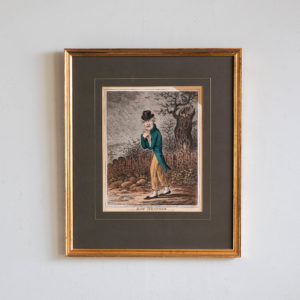
Raw Weather
£400Raw Weather
A framed and mounted, hand coloured engraving by the Georgian satirist James Gilray depicting a sour faced, skinny gentleman walking along a country road on a raw, dry, freezing, winters day. Wrapping his coat close against the biting cold he grimaces in discomfort.£400 -
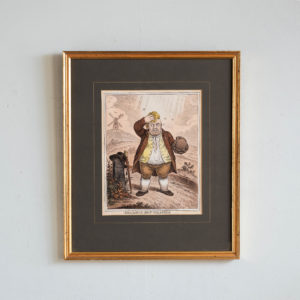
Dreadful Hot Weather
£400Dreadful Hot Weather
A framed and mounted, hand coloured engraving by the Georgian satirist James Gilray in which a corpulent city merchant pauses on the highway next to a milestone on which he has placed his hat and gold tipped walking stick. His waistcoat unbuttoned and holding his horsehair wig in his left hand he pauses to mop his brow all while being stung by insects beneath a burning sun. Though set in fields and near a windmill, the person of the merchant and the milestone likely indicate he is visiting a coutry tavern a short walk from London£400 -
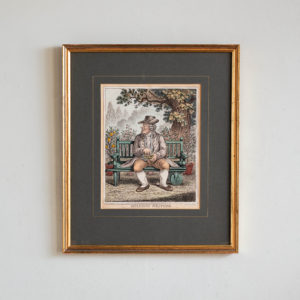
Delicious Weather
£400Delicious Weather
A framed and mounted, hand coloured engraving by the Georgian satirist James Gillray. A smartly dressed, rosy cheeked gentleman enjoys a pinch of snuff in the fine summer weather.£400 -
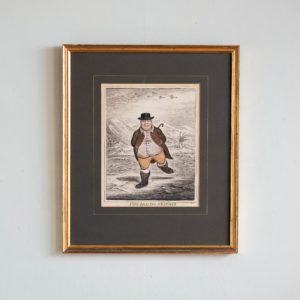
Fine Bracing Weather
£400Fine Bracing Weather
A framed and mounted, hand coloured engraving by the Georgian satirist James Gillray. A stout, well dressed, gentleman skates across a forzen pond on a clear, cold, icy early winters day.£400 -
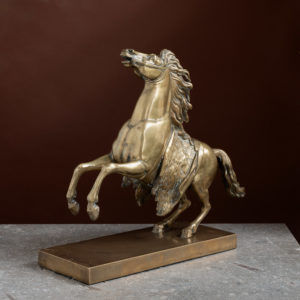
Brass model of a rearing horse,
£400 -
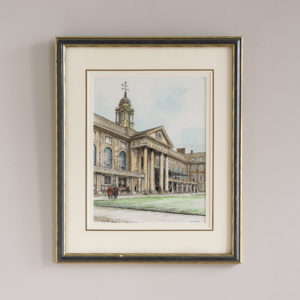
The Royal Hospital at Chelsea
£395The Royal Hospital at Chelsea
A signed watercolour and black-line pen drawing by the painter, printmaker and illustraor Hubert Williams showing the central portico of the north block of the Royal Hospital at Chelsea. Mounted and framed in an original black and gilt Hogarth Frame.£395 -
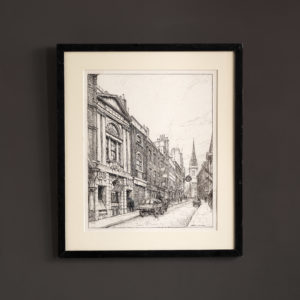
Porters Hall, by Hubert John Williams.
£395Porters Hall, by Hubert John Williams.
Hubert John Williams (1905-1989). Portrait, landscape and architectural painter, etcher and illustrator. Williams was born in Beckenham, Kent in 1905 and later studied at the Royal Academy Schools where he was awarded the Landseer Scholarship for 1928. He also attended the St Martins School of Art and the L.C.C. Schools. Between 1926 and 1939 he exhibited at the Royal Academy, Royal Scottish Academy, Royal Institute of Painters in Oil, and the New English Art Club amongst others. During WWII he worked as a cartographer in the War Office, then as commercial illustrator from 1946 specialising in children's education. His work can be found in many public collections including The Imperial War Museum and Museum of London.£395 -
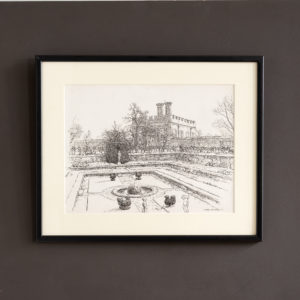
The Pond Garden, Hampton Court, by Hubert John Williams.
£395The Pond Garden, Hampton Court, by Hubert John Williams.
Hubert John Williams (1905-1989). Portrait, landscape and architectural painter, etcher and illustrator. Williams was born in Beckenham, Kent in 1905 and later studied at the Royal Academy Schools where he was awarded the Landseer Scholarship for 1928. He also attended the St Martins School of Art and the L.C.C. Schools. Between 1926 and 1939 he exhibited at the Royal Academy, Royal Scottish Academy, Royal Institute of Painters in Oil, and the New English Art Club amongst others. During WWII he worked as a cartographer in the War Office, then as commercial illustrator from 1946 specialising in children's education. His work can be found in many public collections including The Imperial War Museum and Museum of London.£395 -
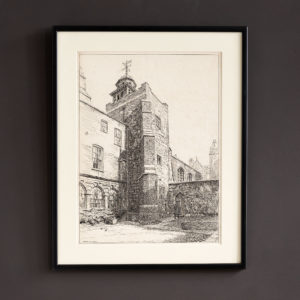
The Charterhouse, by Hubert John Williams.
£395The Charterhouse, by Hubert John Williams.
Hubert John Williams (1905-1989). Portrait, landscape and architectural painter, etcher and illustrator. Williams was born in Beckenham, Kent in 1905 and later studied at the Royal Academy Schools where he was awarded the Landseer Scholarship for 1928. He also attended the St Martins School of Art and the L.C.C. Schools. Between 1926 and 1939 he exhibited at the Royal Academy, Royal Scottish Academy, Royal Institute of Painters in Oil, and the New English Art Club amongst others. During WWII he worked as a cartographer in the War Office, then as commercial illustrator from 1946 specialising in children's education. His work can be found in many public collections including The Imperial War Museum and Museum of London.£395 -
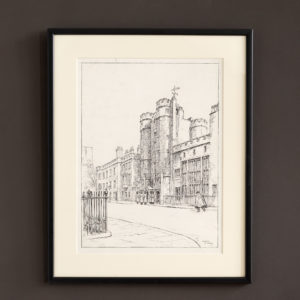
St. James Palace, by Hubert John Williams.
£395St. James Palace, by Hubert John Williams.
Hubert John Williams (1905-1989). Portrait, landscape and architectural painter, etcher and illustrator. Williams was born in Beckenham, Kent in 1905 and later studied at the Royal Academy Schools where he was awarded the Landseer Scholarship for 1928. He also attended the St Martins School of Art and the L.C.C. Schools. Between 1926 and 1939 he exhibited at the Royal Academy, Royal Scottish Academy, Royal Institute of Painters in Oil, and the New English Art Club amongst others. During WWII he worked as a cartographer in the War Office, then as commercial illustrator from 1946 specialising in children's education. His work can be found in many public collections including The Imperial War Museum and Museum of London.£395 -
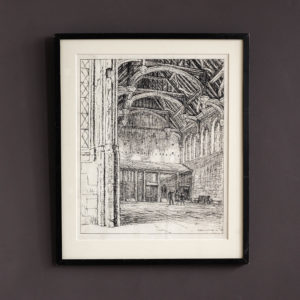
Eltham Palace, by Hubert John Williams.
£395Eltham Palace, by Hubert John Williams.
Hubert John Williams (1905-1989). Portrait, landscape and architectural painter, etcher and illustrator. Williams was born in Beckenham, Kent in 1905 and later studied at the Royal Academy Schools where he was awarded the Landseer Scholarship for 1928. He also attended the St Martins School of Art and the L.C.C. Schools. Between 1926 and 1939 he exhibited at the Royal Academy, Royal Scottish Academy, Royal Institute of Painters in Oil, and the New English Art Club amongst others. During WWII he worked as a cartographer in the War Office, then as commercial illustrator from 1946 specialising in children's education. His work can be found in many public collections including The Imperial War Museum and Museum of London.£395 -
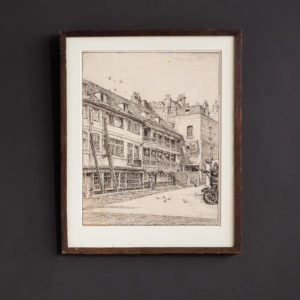
The George Inn, Borough High Street, by Hubert John Williams.
£395The George Inn, Borough High Street, by Hubert John Williams.
Hubert John Williams (1905-1989). Portrait, landscape and architectural painter, etcher and illustrator. Williams was born in Beckenham, Kent in 1905 and later studied at the Royal Academy Schools where he was awarded the Landseer Scholarship for 1928. He also attended the St Martins School of Art and the L.C.C. Schools. Between 1926 and 1939 he exhibited at the Royal Academy, Royal Scottish Academy, Royal Institute of Painters in Oil, and the New English Art Club amongst others. During WWII he worked as a cartographer in the War Office, then as commercial illustrator from 1946 specialising in children's education. His work can be found in many public collections including The Imperial War Museum and Museum of London.£395 -
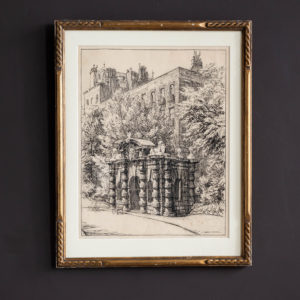
The York Watergate by Hubert John Williams.
£395The York Watergate by Hubert John Williams.
Hubert John Williams (1905-1989). Portrait, landscape and architectural painter, etcher and illustrator. Williams was born in Beckenham, Kent in 1905 and later studied at the Royal Academy Schools where he was awarded the Landseer Scholarship for 1928. He also attended the St Martins School of Art and the L.C.C. Schools. Between 1926 and 1939 he exhibited at the Royal Academy, Royal Scottish Academy, Royal Institute of Painters in Oil, and the New English Art Club amongst others. During WWII he worked as a cartographer in the War Office, then as commercial illustrator from 1946 specialising in children's education. His work can be found in many public collections including The Imperial War Museum and Museum of London.£395 -

The Blackheath Golfer
£395The Blackheath Golfer
A framed colour mezzotint on wove paper by Valentine Green after a painting by Lemuel Abbott showing William Innes (1760-1803) captain of the Society of Golfers at Blackheath, now known as Royal Blackheath Golf Club.£395 -
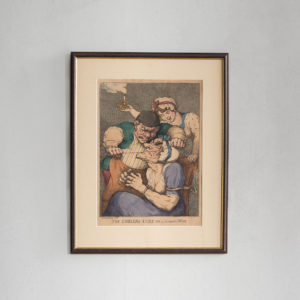
The Cobbler’s Cure for a Scolding Wife
£395The Cobbler’s Cure for a Scolding Wife
A framed, hand-colored etching by Thomas Rowlandson, published by Thomas Tegg. A study in human savagery. A cobbler stands over his wife, a grimacing virago who is tied to a chair with her wrists bound. With his awl between his teeth he pulls at the thread with which he is stitching up her mouth. A buxom young woman leans delightedly over the pair, lighting the work with a small candle. Rowlandson was a chronicler of London life both low and high. Less inclined to political comment than his contemporaries Gilray and Cruikshank he chose instead to focus of the foibles, fancies and failings of common society. His drawings were always harsh and frequently grotesque, even repulsive. The figures in his work are rarely, if ever, held up for our admiration but rather in accordance with his maxim of 1802 that "Man is the only creature endowed with the power of laughter, is he not also the only one that deserves to be laughed at?" Rowlandson's designs were usually executed in outline with the reed-pen, and delicately washed with colour. They were then etched by the artist on the copper, and afterwards aqua-tinted usually by a professional engraver, the impressions being finally coloured by hand.£395 -
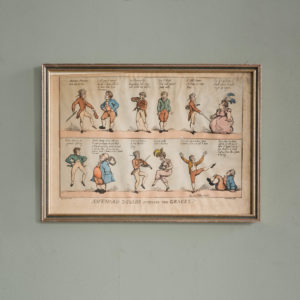
Awkward Squads Studying the Graces
£395Awkward Squads Studying the Graces
A framed, hand-colored etching by Thomas Rowlandson after G. M. Woodward, published by Thomas Tegg. Six comic, caricatured society types are cajoled and corrected by French dancing masters into performing the steps of a fashionable new dance. By the late 18th Century the term 'awkward squad' had passed from military cant into common usage as a description of a group of raw recruits incapable of understanding discipline or not yet sufficiently trained or disciplined to properly carry out their duties. Here Rowlandson, in one of his favourite recurring themes, lampoons the modish aspirations of the would-be fashionable set as they are 'drilled' by their hired dancing masters.£395 -
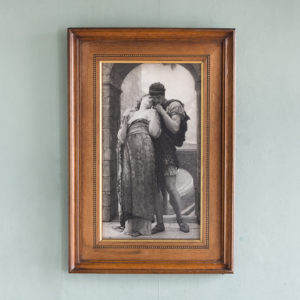
Lord Leighton, Wedded,
£395 -
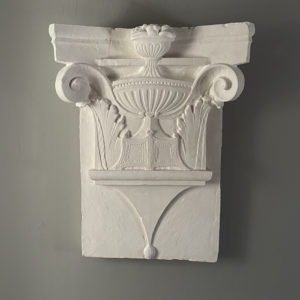
A relief-cast plaster pilaster capital,
£395A relief-cast plaster pilaster capital,
the Roman ionic order capital with splayed volutes centred by a lobed urn in forced perspective,£395 -
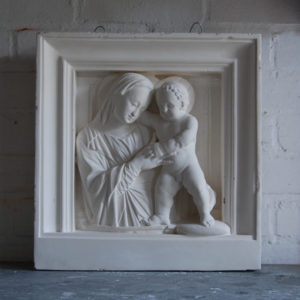
A relief-cast plaster plaque of the Virgin and Child,
£395A relief-cast plaster plaque of the Virgin and Child,
the veiled Madonna, carved standing half-length in front of a shallow niche and supporting the Christ figure who stands partly on a cushion beside her, His right arm around her neck, His left hand on hers,£395 -
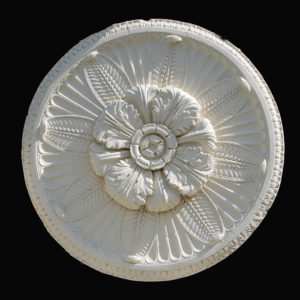
An English relief-cast roundel,
£395 -
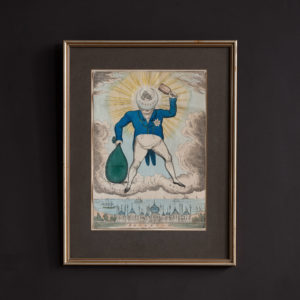
A total Eclipse, or The Moon passing the Sun’s disc
£380A total Eclipse, or The Moon passing the Sun’s disc
Hand coloured line engraving by John Fairburn. King George IV's star is eclipsed by the crecent moon of Catherine of Brunswick while suspended in the sky over the Brighton Pavillion. In his right hand he holds a sack full of slanders. A commentary on the acrimonious public divorce of the King and the Queen Consort in the 1820s;£380 -
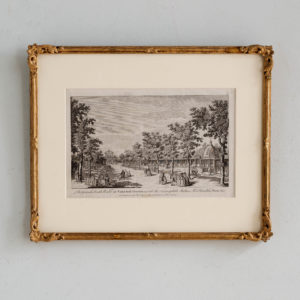
The Grand South Walk in Vaux-Hall Gardens, with the Triumphal Arches, Mr Handels Statue, &c.
£380 -
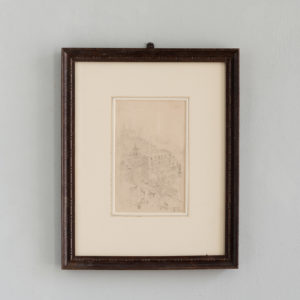
William Lionel Wyllie, The Coal Exchange from the Monument,
£380William Lionel Wyllie, The Coal Exchange from the Monument,
Pencil sketch by acclaimed marine artist William Lionel Wyllie. Initialed W.L.W. framed.£380 -
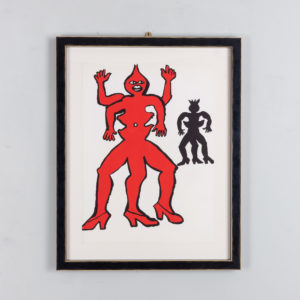
Alexander Calder lithograph from the Crags and Critters series
£380Alexander Calder lithograph from the Crags and Critters series
Published for 'Derrière le Miroir' in 1975. Framed In October 1945, the French art dealer Aimé Maeght opened his art gallery at 13 Rue de Téhéran in Paris. His magazine 'Derrière le Miroir' was created in October 1946 (n°1) and published without interruption until 1982 (n°253). Its original articles and illustrations by the gallery artists were famous at the time. The magazine covered only the artists exhibited by Maeght gallery either through personal or group exhibitions.£380 -
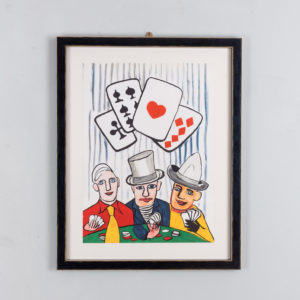
Alexander Calder lithograph of Three Card Players
£380Alexander Calder lithograph of Three Card Players
Published for 'Derrière le Miroir' in 1975. Framed In October 1945, the French art dealer Aimé Maeght opened his art gallery at 13 Rue de Téhéran in Paris. His magazine 'Derrière le Miroir' was created in October 1946 (n°1) and published without interruption until 1982 (n°253). Its original articles and illustrations by the gallery artists were famous at the time. The magazine covered only the artists exhibited by Maeght gallery either through personal or group exhibitions.£380 -
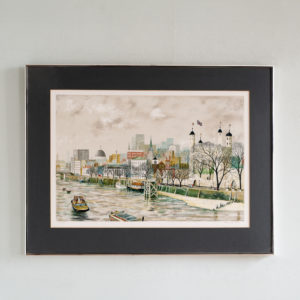
Tower of London,
£375Tower of London,
Mounted and framed, coloured lithorgraph by the pos war artist and printmaker Jeremy King showing the Tower of London from Tower Bridge.£375 -
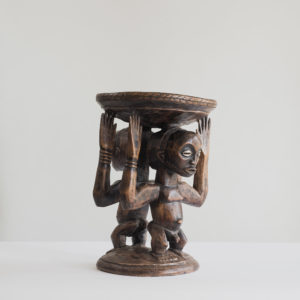
Luba female / male stool,
£375Luba female / male stool,
Luba art relates most commonly to the Kings and Chiefs of the Congolese Luba tribe, who would assert their power by display of ceremonial objects during ceremonies. Stools were considered to be the most important of these objects as they would serve not only as a seat but as a receptacle for the Chief’s spirit. The ruler is thus figuratively and literally supported by a caryatid figure - in this case both male and female standing figures. The male is seen with inset cowrie shell eyes, believed by many African tribes to contain divine powers.£375 -
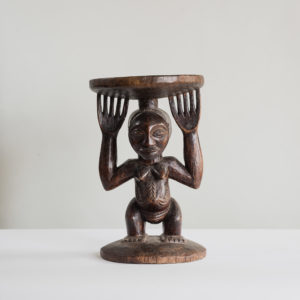
Luba stool
£375Luba stool
Luba art relates most commonly to the Kings and Chiefs of the Congolese Luba tribe, who would assert their power by display of ceremonial objects during ceremonies. Stools were considered to be the most important of these objects as they would serve not only as a seat but as a receptacle for the Chief’s spirit. The ruler is thus figuratively and literally supported by a caryatid figure - in this case a standing female ancestor. The carvings seen on her stomach allude to the maternal - such markings were common among many matrilineal societies in Africa to emphasise and protect the navel as the threshold between oneself, one’s mother and one’s own lineage.£375 -
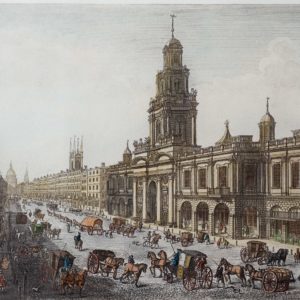
A View of the Royal Exchange London
£370A View of the Royal Exchange London
A framed and mounted hand-coloured engraving showing the Royal Exchange in its second form as designed and built by the architect Edward Jarman in 1669.£370 -
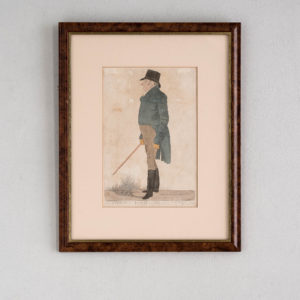
A View from the Old South Sea House
£370A View from the Old South Sea House
A hand-coloured etching by the Regency satirist Richard Dighton showing the brewer James Curtis. Richard Dighton was the son and apprentice of another noted caricaturist Robert Dighton and brother of the battle-scene painter Denis Dighton. The works of Robert and Richard Dighton are regarded as predecessors of the Vanity Fair style of the late nineteenth century. The series of portraits of City and West End characters to which this etching belongs was started in 1817 and Dighton would go on to publish a number of etchings during the next decade before retiring early to Cheltenham. This edition, of 1824, was printed by Thomas McLean Printseller & Publisher at 26 Haymarket, on the eastern side just north of Panton Street. The subject of the print, James Curtis, was a prominent and prosperous London brewer of the early 19th Century and his portrait, painted by Thomas Lawrence, now hangs in the Manchester Art Gallery. The Old South Sea House mentioned was located on the Threadneedle Street corner of Bishopsgate. The back of it apparently burned down in 1826 and was subsequently rebuilt. The building was the headquarters of the South Sea Company. Incorporated in 1711, the company was assigned a monopoly on British trade with Spanish America but, when that failed, it embarked upon a speculative scheme that ended in the economic collapse known as the ‘South Sea Bubble’ which saw many investors ruined. The building was partly remodeled in the 1850s and was eventually demolished at the end of the 19th century£370 -
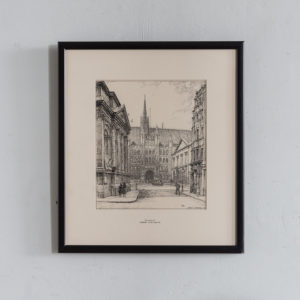
Guildhall by Hubert Williams (1905-1989)
£365Guildhall by Hubert Williams (1905-1989)
Pen & Ink drawing by Hubert Williams beautifully capturing the street life of the late 1920's. Signed. Framed£365 -
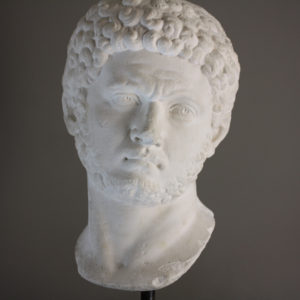
An English plaster head of the young bearded Hadrian,
£365 excluding socle or mounting block,An English plaster head of the young bearded Hadrian,
the head of the young man, slightly larger thn life size, with short curly locks and head turned slightly to the left, pin mounted,£365 excluding socle or mounting block, -
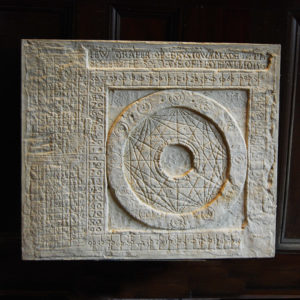
The Hew Draper graffito tablet
£365The Hew Draper graffito tablet
the rectangular tablet incised with a zodiac wheel, signs of the zodiac, numbers and dates for the casting of horoscopes, bearing the inscription "HEW DRAPER OF BRISTOW (Bristol) MADE THIS SPEER (sphere) THE 30 DAYE OF MAYE, 1561" and a founder's stamp "No.1.S"£365 -
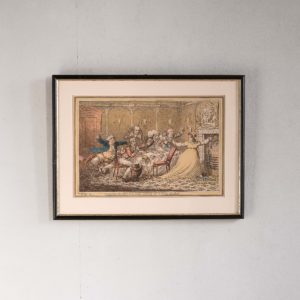
Company shocked at a lady getting up to ring the bell,
£360Company shocked at a lady getting up to ring the bell,
A hand-coloured satirical etching by James Gillray, Published by Hannah Humphrey. Five men are depicted courting a wealthy widow in her luxuriously furnished breakfast parlour over boiled eggs bread and muffins. The widow has risen from her chair to pull a bell-pull while frantic efforts of the suitors to stop her have produced a sequence of disasters. Published by Gillray's long-time and eventual exclusive publisher, Hannah Humphrey. Mrs Humphrey was the sister of engraver William Humphrey and became not only an independent businesswoman in Georgian London but London's leading seller of caricature prints. She began publishing prints in the 1770s at a premises on St Martin’s Lane before moving, first to Old Bond Street, then New Bond Street before finally settling at 27 St James’s Street. James Gillray lodged with Mrs Humphrey for twenty tears from 1791 and although some suspected an illicit relationship it was in all probability a commercial and platonic friendship. Mrs Humphrey cared for Gillray as his sight failed him and later tended to him during the alcohol induced madness of his last five years of life.£360 -
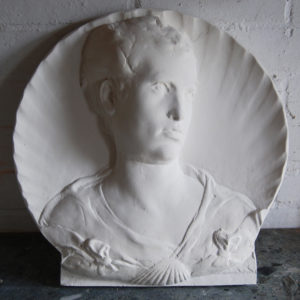
A relief cast plaster plaque of Andrea di Bono,
£360A relief cast plaster plaque of Andrea di Bono,
the portrait head carved in deep relief turning a sinestra, the young man depicted with cloaked shoulders and framed within a scallop shell,£360 -
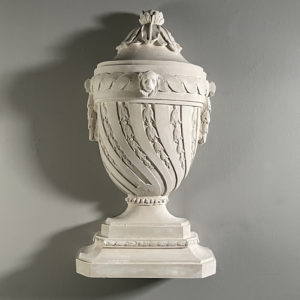
An English relief cast plaster lidded half-urn
£355An English relief cast plaster lidded half-urn
the vase-shaped body with wrythen flutes raised on a socle foot,£355 -
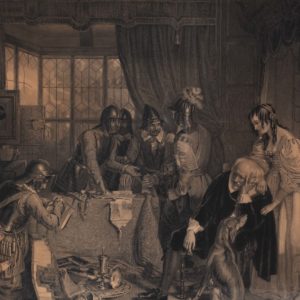
Pillage and Destruction of Basing House, Hants,
£350Pillage and Destruction of Basing House, Hants,
A Mid Victorian engraving by the London artist and printmaker John George Murray after an original oil painting by Charles Landseer showing the plundering of Basing House during the English Civil Wars. Mounted and framed in a walnut ogee profile with foliated gilt slip.£350 -
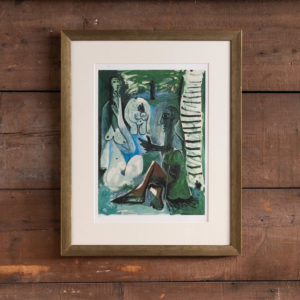
Pablo Picasso, Lithograph of a Study for the Reworking of Edouard Manet’s, Luncheon on the the Grass. c1962
£350Pablo Picasso, Lithograph of a Study for the Reworking of Edouard Manet’s, Luncheon on the the Grass. c1962
From 1959-1962 Pablo Picasso and his second wife Jacqueline lived at Château de Vauvenargues near Aix-en-Provence. He spent most of his time of his time on 140 drawings and 27 paintings, lino-cuts and cardboard models all on the theme of Manet’s, Le Déjeuner sur l’herbe. Manet's original painting from 1862 showing a nude woman sitting between two fully clothed men was a scandal for the time.£350 -
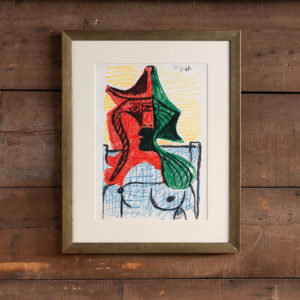
Pablo Picasso, Lithograph of a Bather Study of Edouard Manet’s, Luncheon on the the Grass. c1962
£350Pablo Picasso, Lithograph of a Bather Study of Edouard Manet’s, Luncheon on the the Grass. c1962
From 1959-1962 Pablo Picasso and his second wife Jacqueline lived at Château de Vauvenargues near Aix-en-Provence. He spent most of his time of his time on 140 drawings and 27 paintings, lino-cuts and cardboard models all on the theme of Manet’s, Le Déjeuner sur l’herbe. Manet's original painting from 1862 showing a nude woman sitting between two fully clothed men was a scandal for the time.£350 -
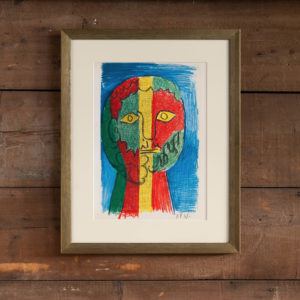
Pablo Picasso, Lithograph of a Head Study of Edouard Manet’s, Luncheon on the the Grass. c1962
£350Pablo Picasso, Lithograph of a Head Study of Edouard Manet’s, Luncheon on the the Grass. c1962
From 1959-1962 Pablo Picasso and his second wife Jacqueline lived at Château de Vauvenargues near Aix-en-Provence. He spent most of his time of his time on 140 drawings and 27 paintings, lino-cuts and cardboard models all on the theme of Manet’s, Le Déjeuner sur l’herbe. Manet's original painting from 1862 showing a nude woman sitting between two fully clothed men was a scandal for the time.£350 -
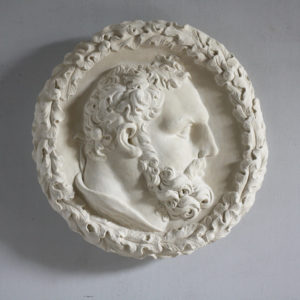
An English relief-cast plaster portrait plaque of Hercules
£350An English relief-cast plaster portrait plaque of Hercules
the roundel centred with a profile portrait of the Greek hero, within a leafy border£350 -
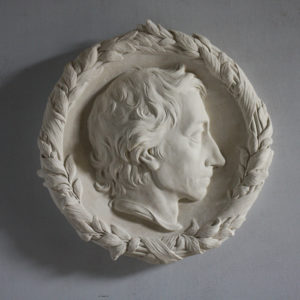
An English relief-cast plaster portrait plaque of Alexander Pope
£350An English relief-cast plaster portrait plaque of Alexander Pope
the roundel centred with a profile portrait of the poet, within a leafy border£350 -
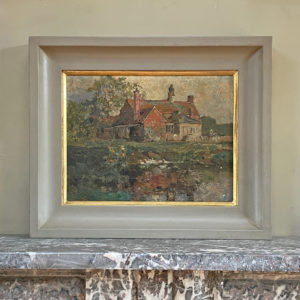
A rural scene oil on panel,
£350A rural scene oil on panel,
the depiction of a cottage, with pond in the foreground, the painting surface crackled, presented in a newly made parcel gilt, waxed and painted pine frame,£350 -
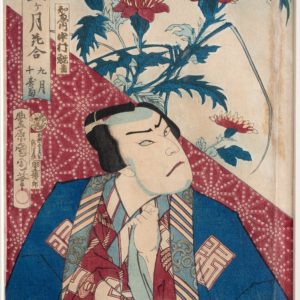
“Twelve Months of Flowers September Senju Chrysanthemum “Chienai Nakamura Suzaku”by Toyohara Kunichika
£350 -
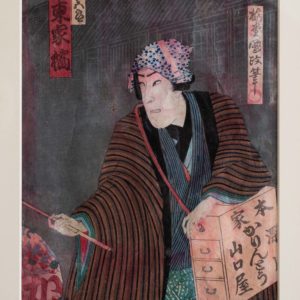
Bandō Kakitsu I, an actor by Baido Kunimasa
£350Bandō Kakitsu I, an actor by Baido Kunimasa
R/H section of a triptych depicting the actor Bandō Kakitsu I playing a karinto merchant in the play Chitose-za shin kyogen Tsuki shiraha bonji horimono.£350 -
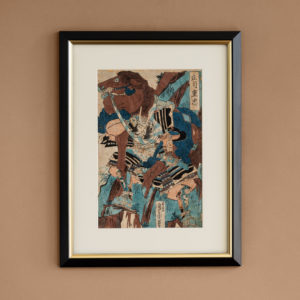
Samurai Warlord, Hatakeyama Shigetada by Utagawa Kunimune
£350Samurai Warlord, Hatakeyama Shigetada by Utagawa Kunimune
Hatakeyama Shigetada, was a warrior of the early Kamakura Period (1185-1333) famed for his virtue and bravery.£350 -
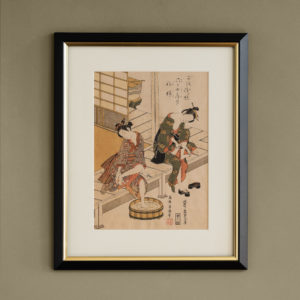
Pedicure by Torii Kiyohiro
£350Pedicure by Torii Kiyohiro
Produced by of the leading artists of the era of two-colour 'benizurie' prints, where the works are printed in pink (beni) and green, a style that peaked in the early 1740s.£350 -
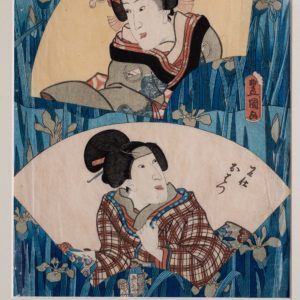
Yaoya oshichi meshitsukai o Hatsu by Utagawa Kunisada
£350Yaoya oshichi meshitsukai o Hatsu by Utagawa Kunisada
Yaoya Oshichi was a daughter of the greengrocer Tarobei, who lived in the Hongō neighborhood of Edo at the beginning of the Edo period. She was burned at the stake for attempting to commit arson. The story became the subject of joruri puppet plays.£350 -
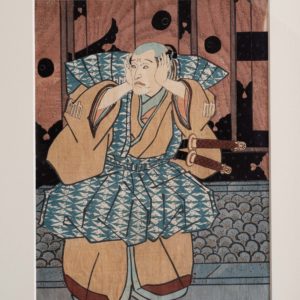
An actor from Chushingura by Utagawa Kunisada
£350An actor from Chushingura by Utagawa Kunisada
Chushingura, was Japan’s most popular kabuki play, with its origins in an event of organized mob violence in 1702, its a complex story of unquestioning loyalty, revenge, conflict, love, and punishment.£350 -
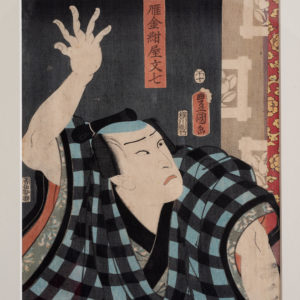
Kataoka Nizaemon VIII as Karigane Kon’ya Bunshichi by Utagawa Kunisada I (Toyokuni III)
£350Kataoka Nizaemon VIII as Karigane Kon’ya Bunshichi by Utagawa Kunisada I (Toyokuni III)
This print originally formed the R/H side from a triptych of the play, Eiyû Koko ni Yorimasa£350 -
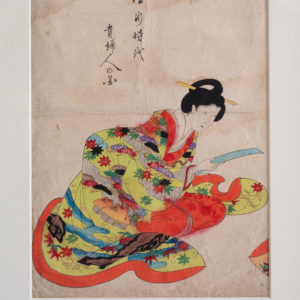
A girl reading poetry by Toyohara Chikanobu
£350A girl reading poetry by Toyohara Chikanobu
This print originally formed the R/H side of a triptych.£350 -
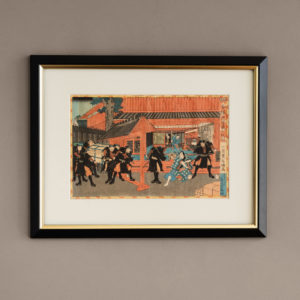
A scene from ’47 Ronin’ a Japanese Samurai Tale, 1852, after Utagawa Fusatane (active 1854-1889)
£350A scene from ’47 Ronin’ a Japanese Samurai Tale, 1852, after Utagawa Fusatane (active 1854-1889)
This print vividly depicts the famous night attack of 47 ronin, or masterless samurai, on the house of Moronao.£350 -
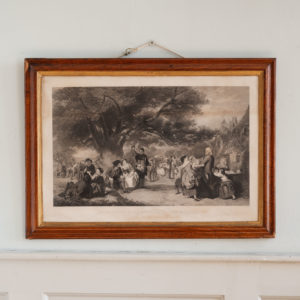
An English Merry-Making in the Olden Time – William Powell Frith
£350An English Merry-Making in the Olden Time – William Powell Frith
An large oak and gilt framed engraving by William Powell Frith showing a village celebration of the mid 17th Century taking place in the shade of a large oak tree.£350 -
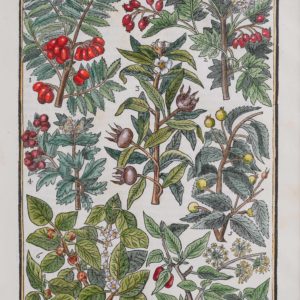
Paradisi in Sole Paradisus Terrestris by John Parkinson (1567-1650)
£350 eachParadisi in Sole Paradisus Terrestris by John Parkinson (1567-1650)
John Parkinson, born c1566, started his working life in medicine, beginning his apprenticeship to a London apothecary. He went on to become one of the most respected apothecaries in Britain. He was elected junior warden of the Society of Apothecaries in August 1620 but at the beginning of 1622, he asked for, and was granted, permission to give up his duties in the Society and then concentrated on his garden in London's Long Acre. Here he started researching and writing his first book: Paradisi in sole paradisus terrestris, and maintained close relations with other important English and Continental botanists, herbalists and plantsmen.£350 each -
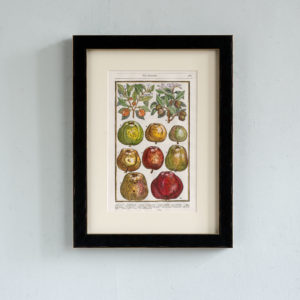
Paradisi in Sole Paradisus Terrestris by John Parkinson (1567-1650)
£350 eachParadisi in Sole Paradisus Terrestris by John Parkinson (1567-1650)
John Parkinson, born c1566, started his working life in medicine, beginning his apprenticeship to a London apothecary. He went on to become one of the most respected apothecaries in Britain. He was elected junior warden of the Society of Apothecaries in August 1620 but at the beginning of 1622, he asked for, and was granted, permission to give up his duties in the Society and then concentrated on his garden in London's Long Acre. Here he started researching and writing his first book: Paradisi in sole paradisus terrestris, and maintained close relations with other important English and Continental botanists, herbalists and plantsmen.£350 each -
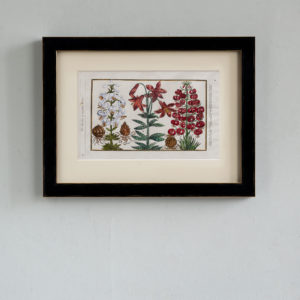
Paradisi in Sole Paradisus Terrestris by John Parkinson (1567-1650)
£350 eachParadisi in Sole Paradisus Terrestris by John Parkinson (1567-1650)
John Parkinson, born c1566, started his working life in medicine, beginning his apprenticeship to a London apothecary. He went on to become one of the most respected apothecaries in Britain. He was elected junior warden of the Society of Apothecaries in August 1620 but at the beginning of 1622, he asked for, and was granted, permission to give up his duties in the Society and then concentrated on his garden in London's Long Acre. Here he started researching and writing his first book: Paradisi in sole paradisus terrestris, and maintained close relations with other important English and Continental botanists, herbalists and plantsmen.£350 each -
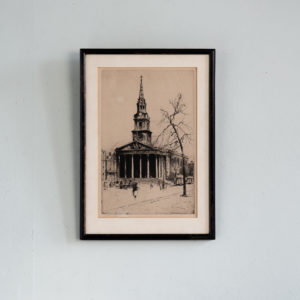
Dorothy Woollard, St. Martin in the Fields,
£350Dorothy Woollard, St. Martin in the Fields,
A framed and mounted original etching by Dorothy Woollard of St Martin-in-the-Fields church, Trafalgar Square. Signed in pencil by the artist.£350 -
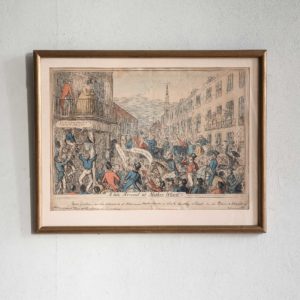
A late Arrival at Mother Wood’s
£350A late Arrival at Mother Wood’s
Hand-coloured etching by George Cruikshank, published by Mr George Humphrey. The scene depicts Caroline of Brunswick, the estranged wife of the newly ascended King George IV, saluting and addressing an adoring crowd from the balcony of Alderman Wood's residence in South Audley Street, London. Alderman Woods was a low-born hop merchant who's investments in a colouring agent for porter had supplied him with the means to further career in Radical politics. He achieved an almost unprecedented two-term mayoralty of the City of London where his opposition to the governments repressive domestic legislation and condemnation of the Peterloo massacre, as well as his perceived upstart vulgarity, made him a hate-figure for Tories and Loyalists. His Whig-Radicalism continued into his term as MP for the City of London and when, in 1820 he saw the chance to embarrass the King and his adherents by the return of his absent and unloved wife, he took it boldly. Woods persuaded Caroline of Brunswick to terminate the discreet ongoing negotiations for a settlement she had been engaged in with the King and instead return, splendidly and publicly, to the capital to assert her claim to be rightful Queen of England. Alderman Woods arranged for Caroline to be conveyed in an open carriage through the heart of London to his house on South Audley Street where she became the unlikely figure-head of Radical Whiggery in the metropolis. The diarist Charles Greville noted of the procession to the house on the 6th of June 1820: "The Queen arrived in London yesterday at seven o’clock… She travelled in an open landau, Alderman Wood sitting by her side and Lady Anne Hamilton and another woman opposite. Everybody was disgusted at the vulgarity of Wood in sitting in the place of honour, while the Duke of Hamilton’s sister was sitting backwards in the carriage". Caroline would spend the next two months at South Audley Street where the the great and the good of British radicalism paid her court amidst the crowds outside South Audley Street.£350 -
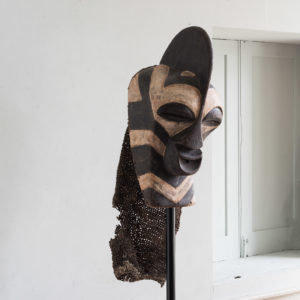
Songye Kilumwe Kifwebe mask (A)
£350Songye Kilumwe Kifwebe mask (A)
Very large Kifwebe mask with exaggerated sagittal crest. It is believed that the sagittal crest and conical protrusion contain the magical strength of the mask.£350 -
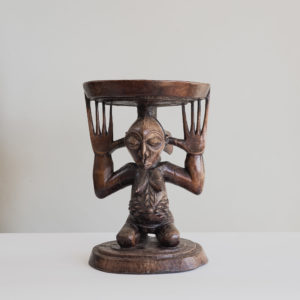
Luba stool,
£350Luba stool,
Luba art relates most commonly to the Kings and Chiefs of the Congolese Luba tribe, who would assert their power by display of ceremonial objects during ceremonies. Stools were considered to be the most important of these objects as they would serve not only as a seat but as a receptacle for the Chief’s spirit. The ruler is thus figuratively and literally supported by a caryatid figure - in this case a kneeling female ancestor with elongated and outstretched fingertips. The deep carvings seen on her stomach allude to the maternal - such markings were common among many matrilineal societies in Africa to emphasise and protect the navel as the threshold between oneself, one’s mother and one’s own lineage.£350 -
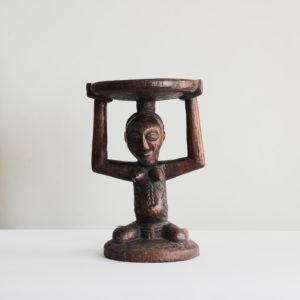
Tabwa stool
£350Tabwa stool
Congolese Tabwa art has distinct similarities to that of the Luba tribe, and its stools are used also in ceremonies by the Kings and Chiefs of the community with a means of establishing power and authority. The key difference seen between the two is the Tabwa’s traditional depiction of braided hair as a carved extension of the head and checkerboard-style scarification of the woman’s body.£350 -
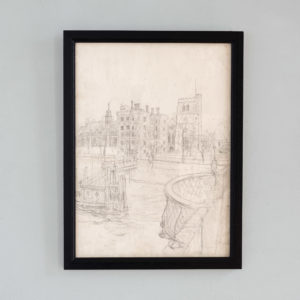
Lambeth Palace and Church by Hubert Williams (1905-1989)
£350Lambeth Palace and Church by Hubert Williams (1905-1989)
Original pencil sketch of Lambeth Palace and Church seen from the old Lambeth suspension bridge. Hubert Williams was an accomplished artist and illustrator who had the confidence to include the detail of everyday life in his views. Signed. framed£350 -
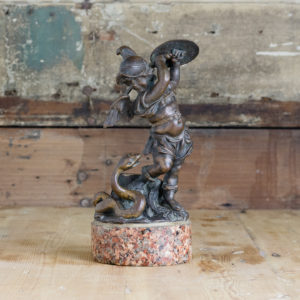
Nineteenth century bronze of the Heroic Putti,
£350Nineteenth century bronze of the Heroic Putti,
modelled holding shield and sword aloft on circular Aswan marble plinth base, possibly German, after the originals from the Mariensäule column in Munich by Ferdinand Murmann.£350 -
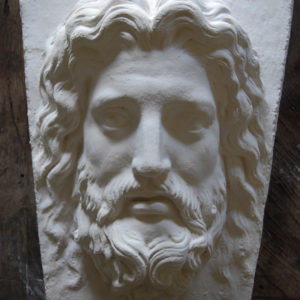
An English relief cast plaster Asclepius keystone
£350An English relief cast plaster Asclepius keystone
the bearded mask modelled on the tapered keystone,£350 -
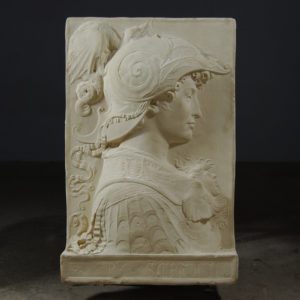
A cast plaster relief of Scipio Africanus
£350A cast plaster relief of Scipio Africanus
the general depicted in fantastical armour in profile,£350 -
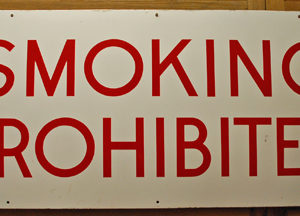
‘Smoking Prohibited’
£350 -
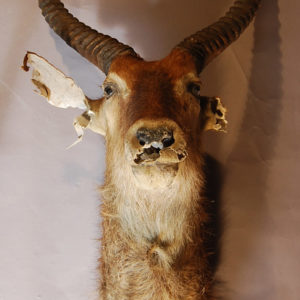
A mounted Waterbuck head
£350 -
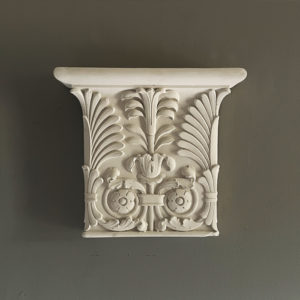
A relief-cast plaster pilaster capital
£345A relief-cast plaster pilaster capital
the capital with palmette clasps to the corners flanking a central stylised palm emanating from a pair of foliate scrolls below,£345 -
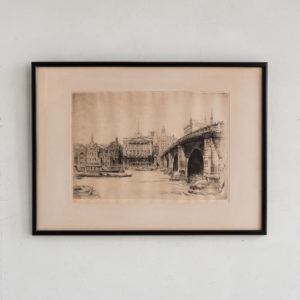
London Bridge by Frederick A Farrell (1892-1935),
£340 -
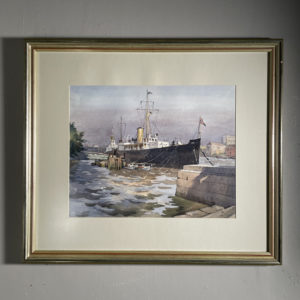
“HMS Chrysanthemum” by A. Taylor
£335 -
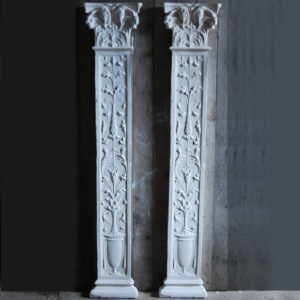
English cast plaster pilasters,
£335 each pilasterEnglish cast plaster pilasters,
the panelled stem ornamented with an ewer issuing stylised foliate ornament and headed with a capital with opposed birds forming the volutes,£335 each pilaster -
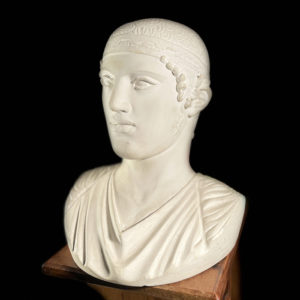
A plaster bust of Heniokhos – or The Delphic Charioteer
£325A plaster bust of Heniokhos – or The Delphic Charioteer
the young charioteer with a serene countenance,£325 -
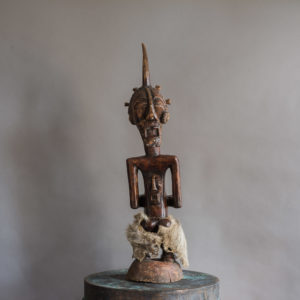
Songye Janus standing power figure,
£325Songye Janus standing power figure,
Congolese double-faced maternal power figure, adorned with animal hide and cowrie shells. The Songye power figure serves to protect its community from evil spirits.£325 -
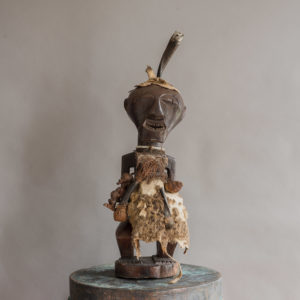
Songye standing male power figure,
£325Songye standing male power figure,
Standing male power figure from the Congolese Songye tribe, beautifully adorned with natural fibres, animal hide, and miniature power figure. These wooden power figures would have served to protect the Songye community from evil spirits and practitioners.£325 -
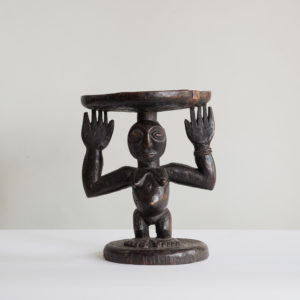
Luba stool
£325Luba stool
Luba art relates most commonly to the Kings and Chiefs of the Congolese Luba tribe, who would assert their power by display of ceremonial objects during ceremonies. Stools were considered to be the most important of these objects as they would serve not only as a seat but as a receptacle for the Chief’s spirit. The ruler is thus figuratively and literally supported by a caryatid figure - in this case a posed female ancestor with a carved headdress and jewellery.£325 -
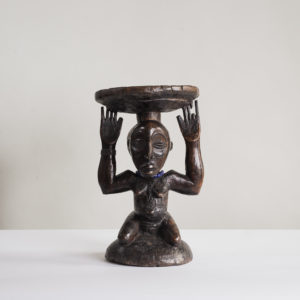
Luba stool
£325Luba stool
Luba art relates most commonly to the Kings and Chiefs of the Congolese Luba tribe, who would assert their power by display of ceremonial objects during ceremonies. Stools were considered to be the most important of these objects as they would serve not only as a seat but as a receptacle for the Chief’s spirit. The ruler is thus figuratively and literally supported by a caryatid figure - in this case a kneeling female ancestor adorned with beaded and carved jewellery. The deep carvings seen on her stomach allude to the maternal - such markings were common among many matrilineal societies in Africa to emphasise and protect the navel as the threshold between oneself, one’s mother and one’s own lineage. Damage to left hand.£325 -
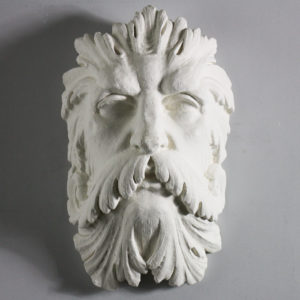
An English plaster relief mask of Father Thames,
£325An English plaster relief mask of Father Thames,
the stern demi-god modelled in relief with leafy hair and beard,£325 -
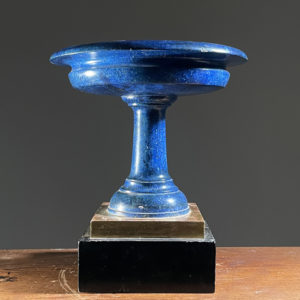
An unusual wooden parcel-gilt and painted tazza bowl on plinth
£320An unusual wooden parcel-gilt and painted tazza bowl on plinth
the turned tazza with stippled blue paint finish in simulation of lapis lazuli, the stepped base gilded and painted black,£320 -
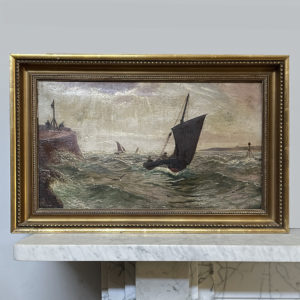
An oil on canvas seascape,
£320An oil on canvas seascape,
depicting a small fishing vessel sailing home between buoy and cliffs, probably a Scottish scene, signed bottom left,£320 -
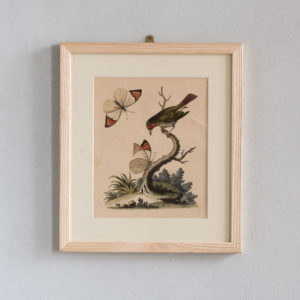
George Edwards,18th century ornithological engravings
£320 eachGeorge Edwards,18th century ornithological engravings
Featuring original hand-colour. Framed in natural ash.£320 each -
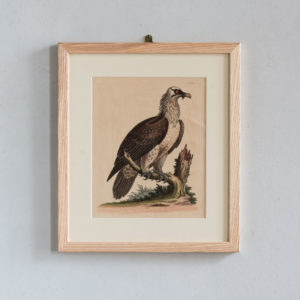
George Edwards,18th century ornithological engravings
£320 eachGeorge Edwards,18th century ornithological engravings
Featuring original hand-colour. Framed in natural ash.£320 each -
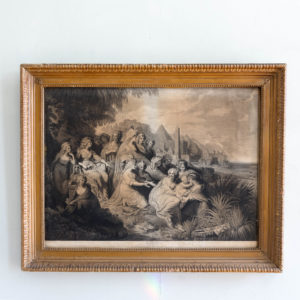
The Finding of Moses by John Keyse Sherwin
£320The Finding of Moses by John Keyse Sherwin
Etching /engraving, lettered with title flanking the Royal arms; and with names 'Painted and Engraved by J. K. Sherwin Historical Engraver / to his Majesty & to His Royal Highness the Prince of Wales / London. Published Jany. 18 1789 by R. Wilkinson No.58 Cornhill & I. K. Sherwin No.67 New Bond Street'. Presented in original gilt frame.£320
Featured Items
-
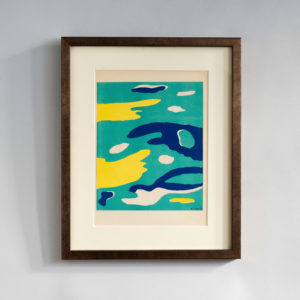
The Four Elements, Water by Fernand Leger, Verve Vol. 1 / No. 1.
£600The Four Elements, Water by Fernand Leger, Verve Vol. 1 / No. 1.
The Verve Review was a purposefully luxurious. It ran from 1937 to 1960, but with only 38 editions available, due to the high degree of design and editorial work dedicated to each issue. Each edition contained unique lithographic prints, commissioned by the editor, and each cover a double-page lithograph elaborated by one of the artists contained within. It was the brainchild of its editor Stratis Eleftheriades, a Greek National who moved to Paris in the early thirties to take part in the growing Modernist movement, writing under the name of Teriade.£600 -
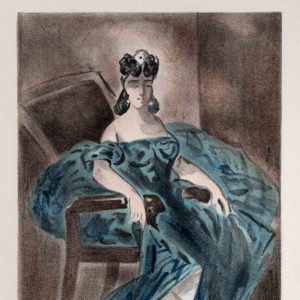
Portraits Part I by Constantin Guys, Verve Vol 2 / No. 5-6.
£500Portraits Part I by Constantin Guys, Verve Vol 2 / No. 5-6.
The Verve Review was a purposefully luxurious. It ran from 1937 to 1960, but with only 38 editions available, due to the high degree of design and editorial work dedicated to each issue. Each edition contained unique lithographic prints, commissioned by the editor, and each cover a double-page lithograph elaborated by one of the artists contained within. It was the brainchild of its editor Stratis Eleftheriades, a Greek National who moved to Paris in the early thirties to take part in the growing Modernist movement, writing under the name of Teriade.£500 -
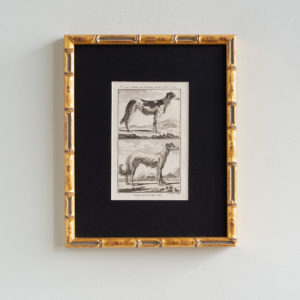
18th Century French Engravings of Dogs
£175 each18th Century French Engravings of Dogs
Published for, Histoire naturelle, générale et particulière (1749–1804), which was the first modern attempt to systematically present all existing knowledge in the fields of natural history, geology, and anthropology.£175 each -
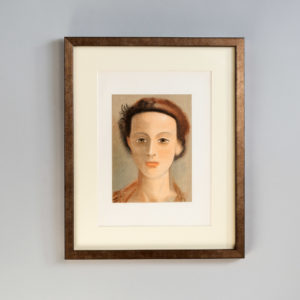
Portrait by Andre Derain, Verve Vol 2 / No. 5-6.
£800Portrait by Andre Derain, Verve Vol 2 / No. 5-6.
The Verve Review was a purposefully luxurious. It ran from 1937 to 1960, but with only 38 editions available, due to the high degree of design and editorial work dedicated to each issue. Each edition contained unique lithographic prints, commissioned by the editor, and each cover a double-page lithograph elaborated by one of the artists contained within. It was the brainchild of its editor Stratis Eleftheriades, a Greek National who moved to Paris in the early thirties to take part in the growing Modernist movement, writing under the name of Teriade.£800
